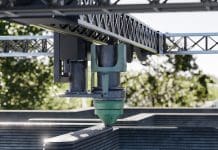Modern Methods of Construction are reshaping construction, and the earth-moving industry must adopt construction technology for efficiency, explains Richard Clement, deputy general manager at Smart Construction
As Modern Methods of Construction (MMC) continue to reshape the building sector, the earth-moving industry must adapt and evolve.
By leveraging technology, the industry can enhance its efficiency, maintain its competitiveness, and seize new opportunities presented by MMC.
MMC has brought a paradigm shift in the building sector, offering benefits like reduced build time, enhanced quality, and sustainability. As MMC continues to gain momentum, there is an increasing need for associated industries, such as the earth-moving sector, to adapt and evolve.
Understanding MMC and its impact
MMC include techniques like volumetric or modular construction, panelised systems, and component and sub-assembly systems. These methods significantly reduce the environmental impact of construction by minimising waste and lowering emissions.
The proportion of new homes built using modern methods of construction (MMC) is predicted to increase from the current 6-10% to 20% of the market share in the coming years, according to a recent report from Savills – but many industry leaders believe this will need to be higher.
This change has especially revolutionised housing developments in recent years, and as well as construction at a quicker pace, the uniform approach to material preparation means less wastage.
This change in the construction approach is most welcome, but we need to ensure all processes are constantly being reviewed and improved.
The need for adaptation in the earth-moving industry
As we broaden our perspective and evaluate the construction process in its entirety, it’s clear that the rise of off-site construction is reshaping the landscape of the building sector. This evolution has made it increasingly critical for the earth-moving industry to adapt to these changes.
Consider the precision needed in site preparation for off-site modules or their transportation and installation logistics. Other factors like thorough site documentation and efficient data exchanges also come into play.
The industry must leverage technology and digital solutions to navigate these challenges effectively. Embracing these tools will ensure the earth-moving sector stays relevant and competitive in this evolving landscape.
Leveraging Smart Construction solutions
Smart Construction’s Dashboard solution boasts the functionality to build a digital twin of the job site.
This allows for real-time datasets to convey the current situation at the job site, assessing cut and fill progress, terrain surveying and elevation analysis.
This impact is that fully informed decisions can be made off-site with full confidence that data is precise and accurate.
This means site managers can quickly review and analyse terrain progress, identifying pressure points during construction to face challenges head-on. This improves planning and management of timescales, informing the next phase of the construction process.
On the other hand, Smart Construction Fleet tracks the progress of machinery at the site.
Where machine idle times show low productivity, site managers can reduce fleet numbers to reduce idle periods or allocate more resources to filling payloads to capacity, ensuring that these moments don’t become a bottleneck to fulfilling the job contract as efficiently as possible.
Now is the time to act
Research tells us in no uncertain terms that the construction industry is falling behind other sectors regarding digital transformation.
There is a huge opportunity here for us to revitalise the way we think about the modern-day construction site, as with improved digitisation comes more efficient processes and the ability to make decisions based on precise insight and data analysis.
Modern construction methods speed up the process, allowing off-site manufacturing to scale up the possibilities.
As offsite construction methods continue their rise in popularity, we expect to see more and more businesses looking for ways to holistically save time and money while maintaining high standards of practice and finish – it’s the future of construction.











![[VIDEO] World’s largest crane lifts final ring at Hinkley Point C Big Carl, the world's largest crane, lifting the final liner ring for Hinckley Point C](https://www.pbctoday.co.uk/news/wp-content/uploads/2024/10/94747-218x150.jpg)


